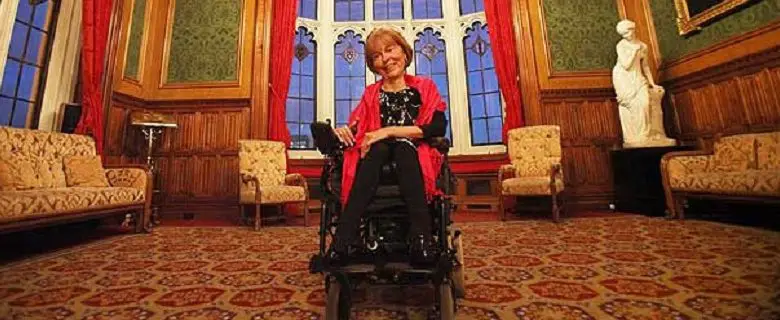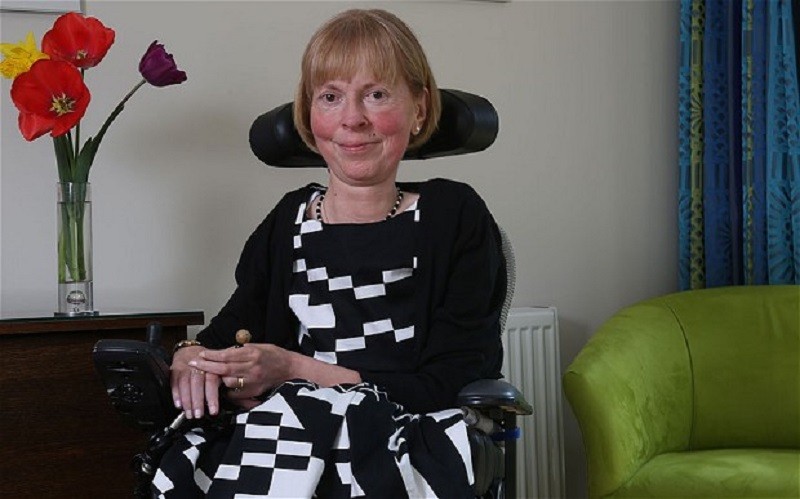
Q&A with Jane Campbell
Jane Campbell, also known as Baroness Campbell of Surbiton, is one of the few severely disabled MPs in the House of Lords today. Before that she’s worked as Chair of the British Council for Disabled people, Co-founder of the National Centre for Independent Living and a commissioner on the Disability Rights Commission, to name but a few.
It’s safe to say that Jane’s career to date has been extraordinary. As is her attitude to life. On her website she states: “When I think about my life, I see it could have gone in one of two directions: one a grey prospect predicted and presupposed by society; and the second, a brighter future, in which I was empowered to defy all society’s predictions. It’s been a journey of tremendous successes and bitter disappointments, of great joy and deep sadness; most important, it has been a journey of enlightenment.”
We talk to Jane Campbell about her incredible career as a disability-rights campaigner and disabled MP, and the state of disabled people’s rights in the UK today.
#DHdisabilitypolitics – join in the conversation @DHorizons
You went to a school and college specially for disabled people, but if you could go back would you have chosen to go to a mainstream school?
Absolutely, yes. I think all segregated schools should be razed to the ground! We will never change society’s attitudes quickly unless we begin with our children. Children learn from playing together. That way, they become colour and gender blind – why not become disability blind too?
Do you think integration of all disabled children into mainstream schools is suitable and that it can be done?
Yes it can, and it has been done in some provinces of Canada – the policy is called “Each Belongs”. Inclusion is not about plonking disabled kids into a mainstream school and leaving them to get on with it. Inclusion is about providing a learning environment where everybody can flourish and grow, whatever their impairment.
How and who helped you to develop in life and your career? What facilities were offered to you as a disabled person entering the world of politics and campaigning?
It has never been easy and I’ve always had to fight disabling barriers along the way. Like with every job, if you’re going to succeed, you’ve got to work hard at it. Unfortunately, disabled people have to expect to overcome prejudices and barriers in the environment that non-disabled people have put in place.
This has been true of my career in politics. As I am probably one of the very few severely disabled people who has become a parliamentarian, I know I have to lead the way for others. I have successfully challenged some of the House of Lords disabling procedures. It’s taken time but I have always believed that we will get there in the end. So far, so good.
Being a woman with a disability, how hard was it to be accepted in a field dominated by men and what were people’s reaction?
Very challenging, but I’ve always liked a challenge. My welcome into Parliament was thankfully a good experience. In the House of Lords we operate in a far more congenial, mutually respectful way than other places. This culture is written in the way that we address and do business with one another. For instance, when we debate in the Chamber, we are never allowed to use the word ‘you’ – everyone is addressed in the third person.
You would be amazed at how this oils the wheels of debate and collaboration. Men will be men the world over, and there is no more sexism in the Lords than I have found working in other large non-governmental organisations. Maybe this is different in the Commons, but so far, so good. That doesn’t mean it’s perfect, and there is definitely room for improvement!
What can young campaigners do to engage better with decision makers?
Listen hard to the voice of experience. The older generation has a great deal of wisdom to impart, but they are often seen as a collective of dinosaurs or past it. In China, the opposite is the case, and much wisdom is handed down through the generations. We should learn from each other in equal measure, and stay in contact continuously.
In the disability movement, I have always wished we were not so hardened and competitive with each other. We’d work more effectively as a collective. This doesn’t mean that leaders are not required – they are. But all leaders have to be humble and in touch with the grass roots. Otherwise they are not leaders in my book.
What advice would you give to disabled people who want to enter politics and be a member of parliament?
Be ready to give up a lot in order to gain a lot. Politics expects 110%, and that’s not easy for disabled people who have a range of needs that have to be taken care of everyday. It’s the same for non-disabled people, especially women with children. We are not alone in our struggle to survive in what can be an extremely demanding and stressful environment. It is relentless and the rewards are very different to what you might expect. But having said that, I wouldn’t change my choice to go into politics one bit.
From all the work that you have done what has been your biggest achievement or the closest to your heart?
That’s like saying who’s your favourite musician! I have so many fond memories of projects I’ve been involved in throughout my life. Each brings new learning and engenders new ideas.
I suppose being centrally involved in campaigning for Direct Payments, and successfully rolling out independent living through exercising choice and control over the way our support is devised and given, is one of my most enjoyable journeys. The same goes for my role in fighting for anti-discrimination legislation.
Among my parliamentary achievements thus far, a highlight must be getting 95% of my Private Member’s Bill on Social Care Portability into the Government’s Care Act. This is rare.
Oh, and overturning a 1707 House of Lords Order, prohibiting anyone apart from peers in the Chamber during debate. I now have my PA by my side. This took two years to achieve. I suppose you could say we made history that day – democracy in action!
Are you still involved in the Equality and Human Rights Commission’s (EHRC) disability program?
I receive briefings from officers within the EHRC, which are invaluable to my work in the Lords. I was recently a member of a Lords Select Committee reviewing the disability provisions of the Equality Act 2010, where we took evidence from the CEO, Chair and Disability Commissioner of the EHRC, which was an interesting experience. Do read the Report online!
How difficult has it been as a Crossbencher with welfare cuts and the political climate disabled people are experiencing at the moment?
In many ways, it has been liberating to be a Crossbencher, trying to amend and improve the Welfare Act and now, to intervene in regulations and post-legislative policies etc. I am not tied to a party, therefore can speak from my own understanding and conviction.
The evidence base is very important to me, and I have been astonished at how some Government policies and legislation sits upon such scanty evidence. As an independent, I feel I am able to hold the Government to account without having to ask permission from my party. On the other hand, it can be quite lonely, as you have to work hard at making allies.
What is your opinion on the upcoming referendum and how much of an impact would the result have on disabled people?
In! In! In! There’s a lot more to cover than I can here, so do take a look at my article on the EU referendum. I am also holding a seminar in the Lords on the case to remain in early June: Better together 100%.
Why is there is no up-to-date cost benefit analysis of the Disabled Facilities Grant resulting in it only being a quarter funded?
Because the results might cause embarrassment to the Government; we still struggle to prove that investing in disabled peoples’ independent living support will pay dividends over and over again. The problem is, it’s a long-term project and our politicians these days can see no further than the next election….
By Raya AlJadir
Join in the conversation by messaging us on Facebook, tweeting us @DHorizons, email us at editor@disabilityhorizons.com or leaving your comments below.
